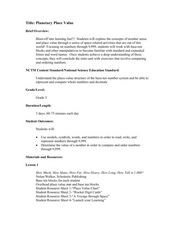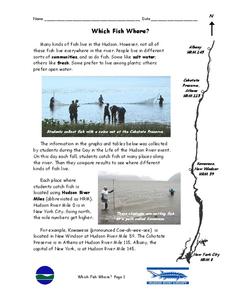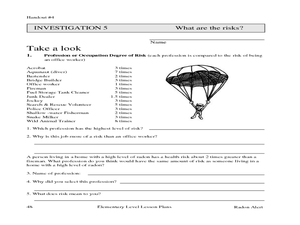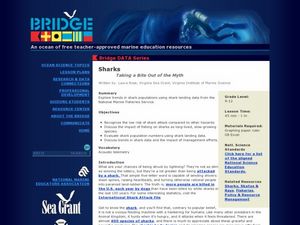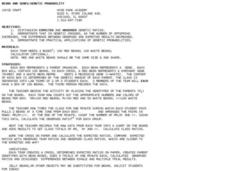Curated OER
Planetary Place Value
Third graders explore place value to the ten thousands place. This incredibly thorough, 24-page lesson has learners construct, order, and compare numbers to 9,999. This three-day lesson includes reteaching and extension activities...
Curated OER
Earth Day Number Sense
Elementary schoolers count and order objects using numbers 1-300. They bring recyclable items from home. Students group the items, skip count by 2's, 3's, and 5's, and arrange the items on a number line. Recyclable plastic bags are put...
National Wildlife Federation
Wherefore Art Thou, Albedo?
In the sixth lesson in a series of 21, scholars use NASA data to graph and interpret albedo seasonally and over the course of multiple years. This allows learners to compare albedo trends to changes in sea ice with connections to the...
Nuffield Foundation
Investigating the Effect of Concentration of Blackcurrant Squash on Osmosis in Chipped Potatoes
Model and explore osmosis using squash and potatoes. Young scientists expose chunks of potatoes to different concentrations of a squash solution. They compare the weights of the chunks before and after exposure to the solution and use...
Science Matters
Earthquake Building/Shaking Contest
Japan is one of only a handful of countries that constructs buildings that are almost earthquake proof. The 13th lesson in the 20-part series challenges scholars to build structures to test against earthquakes. With limited materials and...
Curated OER
How a Liquid Changes to a Gas
Second graders identify three forms of matter- solids, liquids, and gases with 100% accuracy. They observe water evaporating from an open container and water evaporating and condensing in a closed container. The students assess that a...
It's About Time
Elements and Compounds
Young scientists use electrolysis to separate water into its elements before experimenting with fire to learn about their properties. A helpful resource provides a reading passage and analysis questions.
Creative Chemistry
Physical Properties of Group 1 Elements
In this elements worksheet, learners complete a graphic organizer by filling in the symbol and atomic number for the given elements. Students plot a graph of melting point against atomic number. Learners write the electron arrangements...
Curated OER
Head, Heart, Hands, Health
Fourth graders complete a compare and contrast activity for American agriculture historical events. In this historical events in agriculture instructional activity, 4th graders review a timeline and complete research for agriculture in...
Curated OER
Which Fish Where?
Focusing on the fish in the Hudson River Estuary, this activity could be used to practice reading, graphing ,and critical-thinking skills. Answering the 6 questions should be interesting for students due to the interesting subject matter.
NEED Project
Calibrating Thermometers
Engage young scientists in the upper-elementary and middle school grades with this collection of simple experiments. Whether you're teaching about heat transfer, density, or potential energy this resource has a lab for you.
Curated OER
Radon Alert: Understanding Odds
In this radon alert: understanding odds worksheet, 5th graders predict results of rolling dice and record data in a chart, then compare odds of events and occupations, then compare that with radon exposure.
Curated OER
Easy Street
Students work together to complete a simulation on drought days. As a class, they discuss their results and compare water usage of the past to current numbers. After reading short excerpts, they answer discussion questions and review as...
Curated OER
Graphing the Facts
Middle schoolers investigate the correlation between our planet's weather and solar activity. They analyze and discuss data regarding the solar activity cycle, graph annual precipitation and temperature averages over a period of 100...
Curated OER
Catch a Wave. . .
Part of a larger online space science website, this page has a brief explanation of electromagnetic radiation and a chart of wavelengths as compared to common objects. There are four questions to answer about the information. This can be...
Curated OER
Sharks ~ Taking a Bite Out of the Myth
The first thing to know about this lesson is that the commercial fisheries data for the activity no longer seems to be available. That being said, there are fascinating links to other websites, some about the comparative odds of being...
Curated OER
Pebbles, Sand and Silt -- Categorizing Fiction and Informational Books
Primary readers complete the activities in a Pebbles, Sand and Silt FOSS kit. As a class, they are given a group of rocks and they are to categorize them based on their activities in the FOSS kit. They use this information and apply it...
Curated OER
Are Our Chemical Measurements Accurate or Precise?
What is the difference between accuracy and precision? This worksheet has students define the terms accuracy and precision, and compare bulleye diagrams to find examples of both. Students analyze given data and determine the accuracy and...
Curated OER
Climate Change
Students compare weather data and draw conclusions. In this climate change lesson plan, students determine whether data collected over a period of ninety years shows a warming trend.
Curated OER
Constancy and Change
Second graders identify three forms of matter- solids, liquids, and gases with 100% accuracy. They observe what happens when they try to put two kinds of matter into the same space and conclude that solids, liquids, and gases occupy space.
Curated OER
Beans and Genes/Genetic Probability
Students use 2 sets of colored beans to represent the genes of an organism. In this genetic probability lesson plan, students use the colored beans to represent the genotypes of offspring which they pull out of a box at random while the...
Curated OER
The Periodic Table
Eighth graders read and interpret the Periodic Table. They also make decisions on how to group and arrange different kinds of matter and draw the structure of atoms of pure elements. Finally, 8th graders contrast and compare basic...
Curated OER
Good Health
Students complete a unit with cross-curricular activities to learn about a healthy body and maintaining their health. In this health lesson, students complete 8 lessons to learn about good health, a healthy diet, healthy foods, healthy...
Curated OER
Science- Unit on Matter- Solids
Second graders identify and describe properties of matter.
They identify three forms of matter- solids, liquids, and gases with 100% accuracy. The student describes the properties of solid objects.
